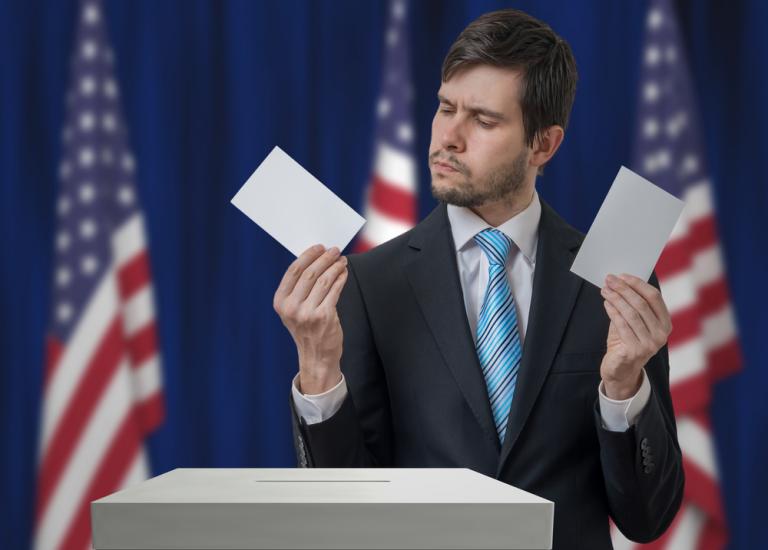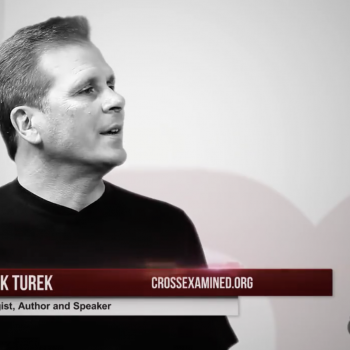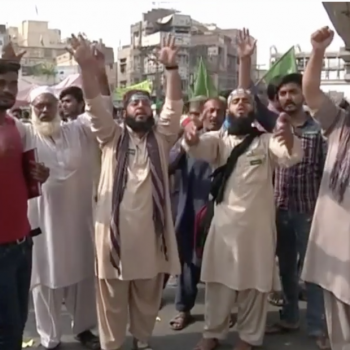This is a guest post by James Zimmerman. He’s the author of the book Deliverance at Hand!: The Redemption of a Devout Jehovah’s Witness.
…

Jehovah’s Witnesses are politically neutral. Or, at least, they’re supposed to be.
Often, when I’ve delivered presentations about my former religion, attendees ask about the political bent of Witnesses. I mention that they don’t vote. Actually, most members of the religion seem to have little knowledge of political candidates, elections, or parties.
For example, when I was in eighth grade, I brought home an assignment from my American Government class. Among the questions on the worksheet asked students to name at least one member of the House of Representatives from our home state of Minnesota. Neither my parents nor I could think of one. We looked in our encyclopedias, but we weren’t sure the information was still current. My dad ultimately called the mother of one of my classmates — also a Witness — and she said her daughter struggled with that question, too. Thankfully, this woman was married to a non-Witness, and he supplied the name of one of our Reps.
But, pressing further, a few people have asked if Witnesses are generally conservative or liberal.
This is a frustrating dichotomy for a number of reasons, but it’s even more difficult to surmise a guess on behalf of an apolitical group.
Witnesses view all governments as evil. They understand them as necessary in our present world but believe governments are all under the Devil’s control. Though they appreciate the freedoms afforded them in many of the world’s democracies, and though they are swift to take advantage of legal means to protect and advance their causes, they have faith that all governments will collectively be dismantled by God in the near future. They pray on behalf of Witnesses living under oppressive regimes and write to officials in countries where Witnesses are banned. They also celebrate any widening berth a government grants Witnesses, viewing this as fulfillment of Bible prophecy.
They refuse to serve in the military, as they feel all wars are simply one pawn of Satan fighting another pawn of Satan, and believe it would be hypocritical to engage in combat against another Witness since they are all united under God’s one true government. Still, they view war itself as a fulfillment of biblical prophecy (“Nation will rise against nation and kingdom against kingdom” — Matthew 24:7). Really, Witnesses feel vindicated with any escalation or de-escalation in armed conflict, as either change is interpreted as a sign of God’s direction (see 1 Thessalonians 5:3 for the converse of Matthew 24:7).
Like secularists, Witnesses believe in the complete separation of church and state. In fact, they view any appeals to the supernatural in the public sphere as grossly misplaced. When they hear public prayers — such as those often delivered at town hall meetings — they shake their heads in disgust. The frequent mention of God in George W. Bush’s first inaugural address made several Witnesses — myself included, as I was a Witness then — wonder if his words were signaling the onset of the final stages of the End Times. It was a Witness whose refusal to stand for the Pledge of Allegiance in school eventually led to a Supreme Court decision making that optional. (The Court actually ruled against the Witness at first, saying schools could require students to stand for the Pledge, but they overturned that ruling three years later.)
High religiosity in political candidates and office-holders causes nervousness among Witnesses because they know they don’t belong to any nation’s predominant religion, and they know that those who push their religion hardest into the public sphere are the ones most likely to restrict the freedoms of religious minorities, Witnesses included.
So with their strong stance on church/state separation, their disdain for armed conflict, and their dismay at our current environmental degradation (unlike most fundamentalists, Witnesses not only accept human-caused climate change as real, but perceive it as another sign of Armageddon’s nearness), it might seem like Witnesses, if they were allowed to vote, would largely vote for liberal candidates. Indeed, that is how most of the former Witnesses that I know do vote. Perhaps, if the thousands of Floridian Witnesses had been allowed to vote in 2000, that state’s electoral outcome might have been known within hours of the polls closing, instead of devolving into the mess it became. Or perhaps the thousands of Witnesses living in states with close results in 2016 could have tipped the tally in favor of someone qualified for office.
However, Witnesses view many of the world’s problems as intractable issues that can only be repaired by divine power and, hence, don’t believe that any politicians — irrespective of their sincerity or intentions — can make any headway regarding climate change, overpopulation, pollution, or any other pressing problem. Additionally, Witnesses are against abortion (without exceptions), gender equality, and LGBTQ rights. I’m not surprised, then, that a sizable minority of former Witnesses I know have identified more strongly with conservative ideas.
Another aspect to consider is the person’s life prior to becoming a Witness. If they leaned conservative prior to joining the Witnesses, they are likely to continue in that mindset if they leave the religion. But for many, myself included, membership in the Witnesses came at birth. Therefore, the rationale for nearly all our viewpoints was predicated on the religion. So, when I discontinued my life as a Witness, I had to ask myself: Now that I no longer have to abide by Witness-endorsed arguments opposing abortion, am I still opposed to it? Now that I no longer see environmental issues through the lens of Bible prophecies, do I still care about the planet? Now that I no longer believe voting is a sin, will I engage in the political process?
In case you’re wondering, there is some actual data behind all of this. The Pew Research Center found in 2014 that 75% of Witnesses would identify as Independent. (No surprise there.) 18% considered themselves Democrats while 7% said Republican.
Ideologically, however, 20% said they were conservative while 12% said they were liberal. Exactly half said they didn’t know.
If that sounds confusing and somewhat contradictory… you’d be right. That’s the Jehovah’s Witnesses for you.
(Image via Shutterstock)




It’s Moving Day for the Friendly ..."
It’s Moving Day for the Friendly ..."
It’s Moving Day for the Friendly ..."
It’s Moving Day for the Friendly ..."